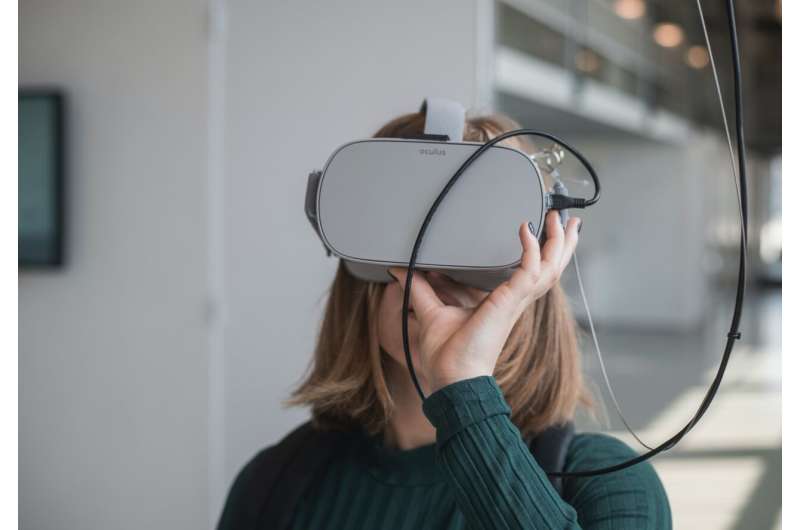This article has been reviewed according to Science X's editorial process and policies. Editors have highlighted the following attributes while ensuring the content's credibility:
fact-checked
trusted source
proofread
VR users need an emotional connection to virtual worlds, not better graphics, study finds

Being wowed by powerful graphics is not enough for a person to feel fully immersed in a virtual-reality (VR) world—a strong emotional response to the simulated environment is essential too, according to a new study from the University of Bath published in the 2023 CHI Conference proceedings.
Indeed, field of view and visual realism—achieved through cutting-edge graphics and usually powered by high-end headsets—can be relatively unimportant in creating a believable VR experience. Far more important is the way a user is made to feel (e.g., happy or scared) within the virtual environment, the study found.
Dr. Crescent Jicol, principal investigator of the study, said, "A lot of money goes into making headsets and screens better and into rendering virtual worlds more realistic, but more effort needs to be centered on improving the user's emotional experience."
Though the findings of this Bath study may ultimately reduce the pressure on gamers to overspend on high-end VR equipment, the implications of this work extend beyond entertainment: in the years ahead, VR is expected to play an ever-growing role in many areas of life, from workplace training to medical rehabilitation programs.
Technical versus human factors
The new Bath study, run by academics in the Department of Computer Science and the Department of Psychology at Bath, is the first to examine how "technical factors" (specifically, visual realism and field of view) interact with "human factors" (specifically, fear, happiness and agency) to impact a user's sense of "presence" in a simulated environment.
Field of view describes the amount of the virtual world you can see around you at any one moment, while agency refers to the impression you have that you can influence the virtual world by interacting with it. Presence is the most studied and important variable in immersive VR and describes the visceral feeling of being in a simulated world.
Elaborating on the study, Dr. Jicol said, "We used a large sample size—360 participants—and found that, counter to previous assumptions, technical factors do not affect presence directly to any meaningful degree. But when technical factors are paired with human factors—for instance, a virtual environment's ability to induce fear and agency—presence is impacted. In other words, 'being there' needs to be complemented with 'doing there' for maximum impact."
All combinations
Study participants played a series of interactive games and then completed questionnaires assessing their sense of presence, felt emotions and agency in the VR world.
The games' human factors (emotion and agency) and technical factors (visual realism and field of view) were manipulated using an experimental design that resulted in all participants interacting with all 16 possible combinations of environments (for instance, one game adopted a wide field of view and induced fear while another adopted poor visual realism but induced happiness). This allowed the researchers to systematically explore the relative importance of the four factors—and their interactions with one another—on presence.
"The main takeaway is that emotion and agency are crucial to inducing presence, but visual realism is not," said Dr. Jicol.
More specifically, the researchers found that VR environments with the most to gain from being graphically realistic were those that induced fear. This became apparent when participants were asked to play a game that involved the protagonist defending themselves against a threatening wolf-like creature by shining a torch in its face.
"Why did the environment benefit from looking more visually realistic? Maybe because people were scrutinizing it more, looking for a way out," said Dr. Jicol.
In a similar game designed to induce happiness, the wolf was replaced by a playful dog and a laser was provided to control the animal's movement and actions. "People felt present without needing to scan the environment and find a way out, which is almost certainly why field of view had absolutely no impact on their sense of presence in that world."
The study's authors hope this research will be followed by further explorations into factors that contribute to an improved user experience of VR. They suspect a user's personality traits may also be important to their sense of presence in a virtual world. They anticipate that the software of tomorrow will be configurable to increase or decrease the emotional and technical content of any given program.
More information: Crescent Jicol et al, Realism and Field of View Affect Presence in VR but Not the Way You Think, Proceedings of the 2023 CHI Conference on Human Factors in Computing Systems (2023). DOI: 10.1145/3544548.3581448




















